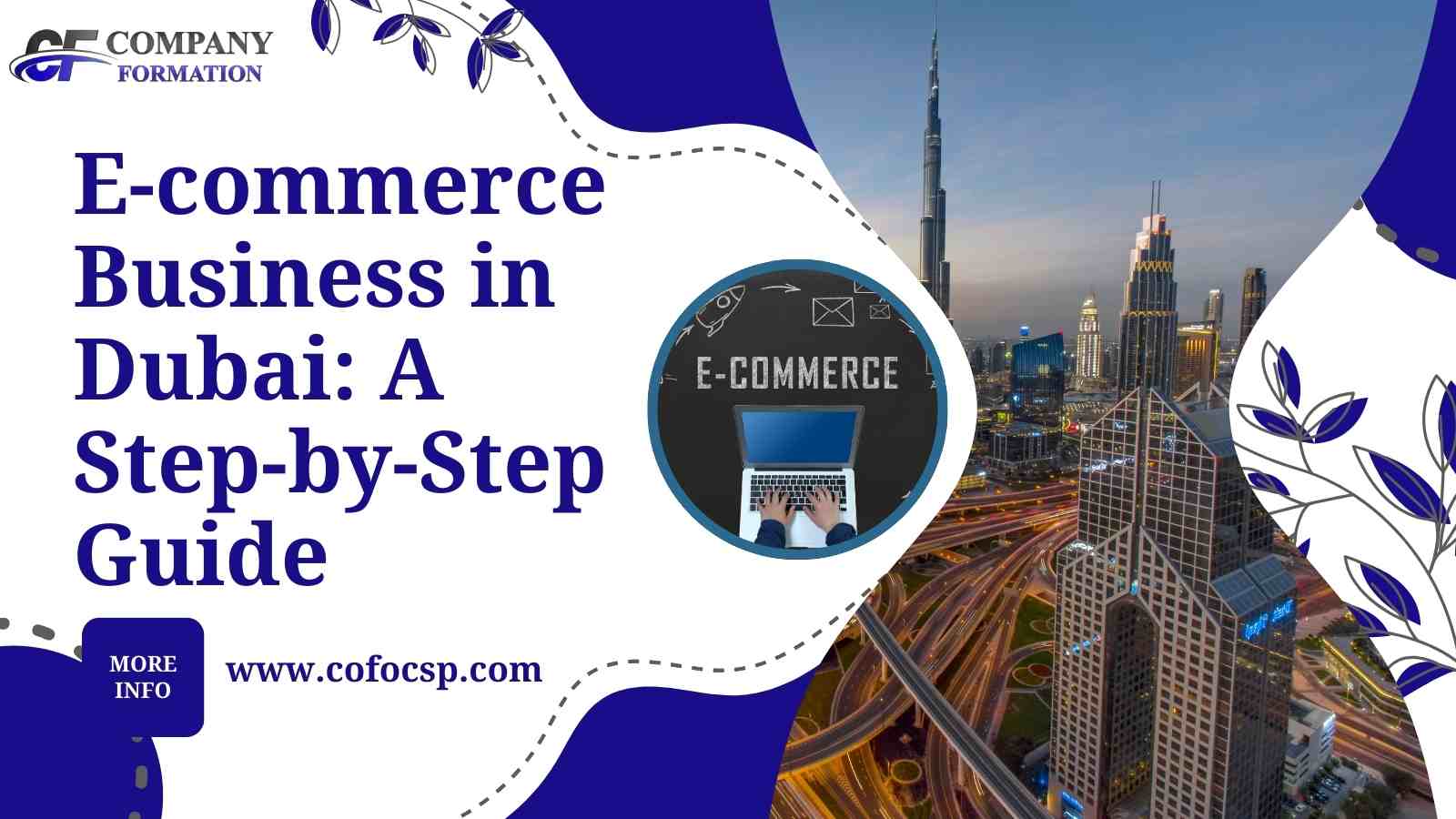Starting an e-commerce business in Dubai involves key steps: conducting market research, choosing between a mainland or free zone setup, registering a business name, obtaining an e-commerce license, and setting up a corporate bank account. Build a user-friendly online store, integrate payment gateways, establish logistics and fulfillment, and implement digital marketing strategies. Dubai offers a tax-free environment, strong infrastructure, and a booming digital economy, making it an ideal hub for online businesses. Follow legal compliance for long-term success.
How to Start E-commerce Business in Dubai, UAE – 2025 Complete Guide
Dubai has rapidly transformed into a global hub for business and innovation, making it an ideal location to start an e-commerce business. With the UAE e-commerce market poised to reach an estimated $17 billion by 2025, the opportunities are immense. Whether you’re an entrepreneur looking to break into the online retail space or an investor aiming to leverage the city’s tax-free environment and strategic location, this guide offers a detailed, step-by-step roadmap.
Why Start an E-commerce Business in Dubai?
Dubai is one of the world’s most dynamic cities, and its e-commerce sector is booming. Here’s why you should consider starting your e-commerce venture in this vibrant market:
A. Booming Digital Economy
Dubai is at the forefront of the global digital transformation. With an ever-growing online consumer base and a strong emphasis on technology, the city offers a fertile ground for e-commerce. The UAE E-commerce Market has seen explosive growth over the past few years, supported by government initiatives and a robust digital infrastructure. The integration of high-speed internet, mobile connectivity, and digital payment systems makes it easier than ever to launch and scale an online business.
B. Business-Friendly Environment
One of the major draws of Dubai is its highly supportive business environment. The government has introduced streamlined regulations that encourage entrepreneurship. Whether you choose a Free Zone Business Dubai or a mainland setup, the regulatory frameworks are designed to minimize bureaucracy and offer maximum flexibility. A tax-free environment, combined with simplified business registration processes, means that you can focus more on growing your business rather than getting bogged down by administrative hurdles.
C. Tax Benefits and Custom Duties
Dubai’s tax-free policies are a huge incentive for any business owner. With zero income tax and various exemptions on import/export duties (especially in free zones), you can retain more profits and reinvest them into scaling your venture. This financial advantage is one of the key reasons why many entrepreneurs choose Dubai as their base for establishing an e-commerce business.
D. Tech-Savvy Population and World-Class Infrastructure
Dubai’s population is not only tech-savvy but also highly adaptable to digital trends. This, coupled with world-class logistics and state-of-the-art payment systems, creates a seamless shopping experience for consumers. The efficient logistics network in Dubai ensures fast and reliable order deliveries, making customer satisfaction a priority. Moreover, the increasing use of mobile devices for online shopping demands that your e-commerce platform is fully optimized for mobile—a challenge that Dubai’s digital infrastructure is well-equipped to meet.

Market Research and Business Planning
Before jumping into the e-commerce scene, thorough market research and business planning are critical. Here’s how you can get started:
- Identify Your Niche: Research the specific segments within the Dubai E-commerce Market that are underserved. This might include niche retail goods, specialty food items, eco-friendly products, or unique digital services.
- Understand Consumer Behavior: Analyze local consumer trends and buying habits. Look at demographic data and trends such as the increasing influence of social media on shopping decisions.
- Competitive Analysis: Identify the key players in your chosen niche. Evaluate what they’re doing well and where there might be gaps. Are there areas where customer service is lacking, or is there room for a more personalized shopping experience?
- SWOT Analysis: List your strengths, weaknesses, opportunities, and threats. This will help you understand where your business can gain a competitive edge.
- Financial Projections: Prepare a detailed business plan outlining your startup costs, projected revenues, and a clear timeline for growth. Consider factors such as licensing fees, setup costs, and marketing budgets.
By addressing these points, you’re not only setting a solid foundation for your business but also aligning your strategy with the high-priority entities and keywords that boost your online visibility.
Choosing the Right Business Location
One of the first strategic decisions you need to make is where to Business Setup in dubai. The choice typically comes down to two main options: Mainland and Free Zone.
A. Mainland vs. Free Zone
1. Mainland Setup:
- Advantages:
- Full access to the UAE local market.
- Flexibility in business activities.
- Opportunity to work with government entities and local businesses directly.
- Disadvantages:
- Requires a local sponsor for some business types.
- Higher setup and operational costs.
- More stringent regulatory requirements.
2. Free Zone Setup:
- Advantages:
- 100% foreign ownership.
- Simplified and streamlined company formation process.
- Attractive tax benefits, including zero corporate and personal taxes.
- Customs duty exemptions in some free zones.
- Disadvantages:
- Restrictions on trading directly with the local UAE market.
- Limited business activity scope depending on the free zone.
- Ongoing fees may be lower initially but can add up with additional services.
Most new e-commerce entrepreneurs opt for the Free Zone Business Dubai option because of the ease of setup and the tax-friendly environment. However, your choice should align with your long-term goals and the specific needs of your business.
Selecting the Best Business Structure
Choosing the right legal structure is essential for protecting your personal assets and ensuring smooth operations. The most common structures for e-commerce businesses in Dubai include:
- Limited Liability Company (LLC):
An LLC offers limited liability protection to its owners while allowing flexibility in operations. It’s ideal for businesses that plan to have multiple partners or investors. - Free Zone Company:
Perfect for foreign investors, a free zone company allows 100% ownership without the need for a local sponsor. This structure is particularly popular for online businesses due to the streamlined setup process and lower regulatory hurdles. - Sole Proprietorship:
Suitable for small-scale operations or startups, this structure allows you to run your business as an individual. However, personal assets remain at risk since there is no legal separation between the owner and the business.
Each business structure has its own set of benefits and challenges. Evaluate your business model, financial projections, and long-term plans to determine which structure best suits your needs.
Business Name Registration
Your business name is more than just a label—it’s a key part of your brand identity and SEO. Follow these steps for effective name registration:
- Choose a Compliant Name:
Ensure your business name complies with UAE naming conventions. It should be unique, professional, and reflect your industry. Avoid names that are offensive or too generic. - Check Availability:
Verify the availability of your chosen name with the relevant authorities. This step is crucial to avoid trademark conflicts and ensure that your brand stands out. - Approval Process:
Submit your chosen name for approval to the Department of Economic Development (DED) or the relevant free zone authority. The approval process may take a few days, so plan accordingly.
Obtaining an E-commerce License
An e-commerce license is a legal requirement to operate your online business in Dubai. The process may vary depending on whether you’re business setup in mainland or in a free zone. Here’s what you need to know:
A. Primary Requirements
- Valid Passport Copies:
Provide passport copies of shareholders and managers. - Business Plan Outline:
A clear business plan is essential to demonstrate your business model and growth strategy. - Trade Name Reservation:
Reserve your approved business name as part of the licensing process. - Office Space and Visa:
Secure a physical office or warehouse if required, and provide the necessary tenancy contract. Some licenses require a local sponsor, so check the specific requirements for your chosen jurisdiction. - E-trader License Option:
For small-scale operations, consider the e-trader license—a cost-effective option that allows you to begin your operations on a limited scale.
B. Documentation and Legalities
The licensing process involves submitting a series of documents:
- Application Form:
Fill out the application form provided by the licensing authority. - Supporting Documents:
These may include your business plan, proof of address, and relevant certifications. - Compliance Checks:
Ensure that your business adheres to local consumer protection laws and data privacy regulations (such as the UAE Data Protection Law).
Obtaining your e-commerce license is a critical step in legitimizing your business and building trust with customers.
Step for Corporate Bank Account Setup
A dedicated corporate bank account is vital for managing your finances and processing online payments. Follow these steps:
- Choose a Reputable Bank:
Research banks in Dubai that offer corporate banking services. Consider factors such as transaction fees, online banking facilities, and customer service. - Prepare Required Documents:
Gather your Trade License , passport copies, and any other required documentation. Some banks may request additional documents like a business plan or financial projections. - Schedule an Appointment:
Meet with a banking specialist to discuss your needs and set up your account. This is a great opportunity to ask questions about payment gateway integrations and international transactions.
A well-managed bank account not only simplifies financial management but also enhances your business credibility in the eyes of customers and investors alike.
Creating a User-friendly Online Store
Your website is your digital storefront. It needs to be engaging, easy to navigate, and optimized for both users and search engines. Here’s how to create a successful online store:
A. Choosing an E-commerce Platform
Consider platforms like Shopify, Magento, or WooCommerce. When selecting a platform, keep these factors in mind:
- Ease of Use:
The platform should be user-friendly, even for those without technical expertise. - Customization Options:
A customizable design helps you align the website with your brand identity. - Mobile Responsiveness:
With the high smartphone adoption rate in Dubai, your site must be optimized for mobile devices. - SEO-Friendly Features:
Look for features such as customizable meta tags, URL structures, and fast loading speeds to enhance your search rankings.
B. Website Design and SEO Best Practices
- Clean, Modern Design:
Ensure that your website design is visually appealing and supports easy navigation. - High-Quality Content:
Develop engaging product descriptions, blog posts, and landing pages that naturally incorporate primary and secondary keywords. - Internal Linking:
Use a strategic internal linking structure to help search engines understand your site’s content hierarchy. - Optimized Images:
Use alt text with keywords for each image to boost SEO (e.g., “Online Storefront Dubai – E-commerce Business Setup”). - Fast Loading Speeds:
Optimize images and use a reliable hosting service to ensure fast loading times, as page speed is a key ranking factor.
Logistics, Fulfillment, and Payment Systems
A seamless logistics and payment system is essential for ensuring a positive customer experience. Here’s what you need to consider:
- Logistics Partners:
Choose reliable third-party logistics providers or develop an in-house fulfillment strategy. Consider factors like delivery speed, package tracking, and cost efficiency. - Payment Gateways:
Integrate multiple payment options (Visa, Mastercard, Apple Pay, cash on delivery) to accommodate different customer preferences. Ensure the chosen gateways are secure and reliable. - Inventory Management:
Utilize modern inventory management software to track stock levels, manage orders, and handle returns efficiently. - Customer Service:
Establish a robust customer service system to address inquiries, returns, and complaints quickly, enhancing overall user trust.
Legal and Regulatory Compliance
Ensuring legal compliance is non-negotiable when setting up an e-commerce business in Dubai. Here’s how to stay on the right side of the law:
- Consumer Protection Laws:
Familiarize yourself with UAE consumer protection laws, ensuring transparent pricing, clear return policies, and secure payment methods. - Data Privacy Regulations:
Adhere to data protection laws such as the UAE Data Protection Law and, if applicable, international standards like GDPR. - VAT Registration:
If your annual turnover exceeds the mandatory threshold (currently AED 375,000), register for VAT with the Federal Tax Authority (FTA). - Licenses and Permits:
Make sure you maintain all necessary licenses, permits, and certifications. Regularly update these documents to remain compliant.
Consult with legal experts specializing in UAE e-commerce regulations to avoid pitfalls and ensure that your business operations are fully compliant.
Developing a Digital Marketing Strategy
Even the best online store won’t attract customers without a solid digital marketing strategy. Here’s how you can boost your online presence:
- SEO:
Optimize your website content with high-priority keywords such as “E-commerce Business in Dubai,” “Online Business Setup in Dubai,” “E-commerce License Dubai,” and “Free Zone Business Dubai.” Use semantic keywords, long-tail phrases, and NLP entities throughout your content. - Social Media Marketing:
Leverage platforms like Instagram, Facebook, and LinkedIn to build brand awareness. Tailor your content to resonate with Dubai’s diverse, tech-savvy audience. - Email Marketing:
Develop targeted email campaigns to nurture leads and convert them into loyal customers. Personalize your messaging to address customer pain points and build trust. - Paid Advertising:
Consider PPC and social media ads to drive immediate traffic. Use transactional and navigational keywords in your ad copy to improve click-through rates. - Influencer Partnerships:
Collaborate with local influencers who can help promote your brand authentically. This human element can be highly effective in a competitive market.
Cost Breakdown and Financial Management
Understanding the costs involved in starting an e-commerce business in Dubai is crucial for budgeting and planning. Here’s a general breakdown:
- E-commerce License Costs:
- E-trader License: Starting from AED 1,070 (ideal for small-scale businesses).
- Mainland Company License: Approximately AED 12,000 to AED 30,000, depending on business activities.
- Free Zone Company License: Typically begins around AED 5,750, with variations based on the free zone and specific license package.
- Setup Costs:
- Office or Warehouse Lease: Costs vary by location and size.
- Website Development: Depending on your platform and customizations, costs can range from AED 5,000 to AED 20,000.
- Marketing and Advertising: Budget allocations for SEO, PPC, and social media marketing may start at AED 3,000 per month.
- Operational Costs:
- Logistics and Fulfillment: Costs depend on volume and service providers.
- Payment Gateway Fees: Typically a percentage of each transaction.
- Additional Fees:
- Visa Processing: Applicable for obtaining work or investor visas.
- Bank Account Setup: Some banks may charge fees for corporate accounts.
Implement financial management software to keep track of your expenses, revenue, and profitability. Regularly review your financial performance to make necessary adjustments.
E-Commerce Business in Dubai FAQs
Starting an e-commerce business in Dubai can be challenging. Here we address some of the most common concerns:
Q1: What are the primary challenges when starting an e-commerce business in Dubai?
Some common challenges include understanding local licensing requirements, managing operational costs, choosing between a mainland or free zone setup, and navigating complex legal regulations. However, thorough market research and expert guidance can help you overcome these hurdles.
Q2: How long does it take to obtain an e-commerce license?
The timeline varies depending on whether you set up Business in the mainland or a free zone setup. Typically, the process can take anywhere from a few days to a couple of weeks if all documentation is in order.
Q3: Which payment gateways are best for e-commerce businesses in Dubai?
Popular payment gateways include Visa, Mastercard, Apple Pay, and local options that support cash on delivery. It’s important to choose a provider known for reliability and security.
Q4: How do I ensure legal compliance and protect customer data?
By staying updated on UAE consumer protection laws and data privacy regulations, you can ensure compliance. Investing in secure IT infrastructure and consulting with legal experts will help safeguard customer data and build trust.
Q5: What is the difference between setting up in a free zone versus the mainland?
A free zone offers 100% foreign ownership, lower initial costs, and tax benefits, but may restrict your ability to trade directly within the UAE market. A Business Setup in mainland provides broader market access but often involves higher costs and the need for a local sponsor.
E-commerce Success in Dubai
Starting an e-commerce business in Dubai is not just an opportunity—it’s a pathway to tapping into one of the world’s most dynamic digital markets. With a booming digital economy, a business-friendly environment, and the strategic advantages of tax exemptions and robust logistics, Dubai offers the perfect stage for your online venture.
In this guide, we’ve walked you through every crucial step—from understanding market dynamics and conducting thorough research, to choosing the right business location, obtaining your e-commerce license, setting up a user-friendly online store, and developing a comprehensive digital marketing strategy. We’ve also addressed key pain points and provided actionable insights to help you navigate the challenges of setting up your business.
Remember, the key to success is not just in following the steps but in adapting them to your specific needs and staying updated on the latest market trends. Whether you choose a free zone or mainland setup, ensure that you leverage the benefits of Dubai’s e-commerce market and integrate best practices in digital marketing, legal compliance, and customer service.
Conclusion
In today’s competitive digital landscape, every detail counts. From strategic keyword placement to understanding local market nuances, every step you take is critical. We hope this guide has given you the insights and actionable steps needed to launch your e-commerce business in Dubai successfully. Now, it’s time to take the plunge, implement these strategies, and watch your business soar.
If you’re still unsure about any aspect of the process—whether it’s about licensing, setting up your online store, or choosing the right digital marketing strategies—consider consulting with local experts who can provide tailored advice and support.
Here’s to your e-commerce success in Dubai!







